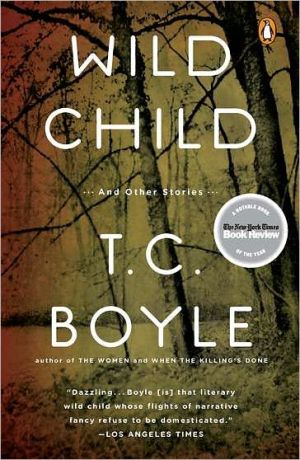

 |

|

The average rating for Wild Child based on 2 reviews is 4 stars.
Review # 1 was written on 2015-11-27 00:00:00 Stewart Johnson Stewart JohnsonHerr Boyle is a personal favourite, and a hard man to keep pace with. This collection is a bit uneven perhaps (as is usually the case in a writer so prolific), but was always entertaining, and showcased TCB's enviable ability to inhabit such a wide variety of fictional narrators' worlds. The long title story is a particularly strong channeling of Flaubert, all pitiless show and no tell in its covering of the same non-fictional terrain (a feral young boy is discovered in the forest of a post-revolutionary France that intends to civilise the savage out of him) that was brought to cinematic life by Truffaut decades ago. But "Balto", which is a split narrative concerning a ne'erdowell single father facing a second DUI and the loss of his two daughters if his eldest refuses to lie for him in court, is damn near miraculous. I have probably read it 20 times, and could easily read it 20 more. ************************** Stories 1. Balto: see above... 2. La Conchita: not-too-congenial self-employed white guy gets involved in digging out a family from a California mudslide, in spite of himself 3. Question 62: woman who feeds stray cats gets involved with a man pushing to have stray cats euthanized 4. Sin Dolor: ageing doctor relates his history with a young male patient who was born unable to feel pain 5. Bulletproof: man attends school board meeting where teaching of evolution is being debated, becomes involved with a woman who believes in [sic] Intelligent Design 6. Hands On: how far would you go with the plastic surgeon? 7. The Lie: I've always wanted to make up the perfect lie to get out of going to work, but man, this one takes the cake 8. The Unlucky Mother of Aquiles Maldonado: Hobson's choice: if you don't negotiate with peeps who kidnap your mom, you lose. If you do negotiate with them, you lose. 9. Admiral: Rich folk clone a dog, hire the woman who walked the original Admiral to dog-walk Admiral II. All goes well, hahaha. 10. Thirteen Hundred Rats: What the title sez. Not pretty. 11. Anacapa: Two overprivileged 40-something white boys prolong their friendship past its sell-by-date, hit on same woman during a just-like-the-old-days reunion 12. Three Quarters of the Way to Hell: Great story about two personal-baggage-laden session musicians who somehow get Platonically right in time with each other during the recording of a really cheesy Xmas tune. A fave in this volume. 13. Wild Child: see above.... |
Review # 2 was written on 2011-11-28 00:00:00 Elijah Seeker Elijah SeekerEach story in Wild Child is assured, in-your-face, and perfectly executed; Boyle is a master of the genre. The stories are so deep and insightful that I could imagine any one of them being extended into a full-length, absorbing novel. His themes seem peculiarly contemporary and American - very much of their place and time, but not as if that is a limitation. With the exception of two stories, this is California incarnate: immigrants, people of Asian and Latino descent, sushi, coastal and island scenery, the music and movie biz. Boyle alternates expertly between third- and first-person narration, and his tales are rich with foreboding and tragic potential. Many begin with a simple hint of menace: a hidden gun, a small lie that becomes overblown, a few pet rats that horrifyingly, nauseatingly multiply to 1300. I am convinced Boyle could write an engrossing story on any subject, but especially interesting for me is his preoccupation with cutting-edge science, including conservation: there is an imagined new 'Scopes monkey' trial, debating the right of teachers to teach on evolution in schools ("Bulletproof"), the cloning of beloved pets ("Admiral"), organ transplantation ("La Conchita"), the possibility of a person never feeling pain ("Sin Dolor"), gratuitous cosmetic surgery ("Hands On"), and house cats threatening songbird populations ("Question 62" - similar in theme to Jonathan Franzen's Freedom). There are also foretastes of the subject matter of When the Killing's Done, such as the plague of rats and a boat trip out towards Anacapa island. "Wild Child," the final novella of 60-some pages, is the only historical story, but unlike, say, the final story in Wells Towers's collection, Everything Ravaged, Everything Burned, it does not feel strained or out of place here. Boyle retells the story of Victor, the 'Wild Boy of Aveyron,' and specifically his training with Doctor Itard. Feral children are fascinating test subjects for questions of domestication versus wildness, instincts versus learned behavior, and so on. A few years ago I read an intriguing study of the feral child phenomenon (Savage Girls and Wild Boys, by Michael Newton), and it's no surprise to me that authors find the idea inspiring. As Boyle asks of Victor's experience: What must it have been like to be abandoned, to have your throat cut, to be captured and imprisoned and without defense except to sink your teeth into the slowest and weakest of your tormentors? To throw off your clothes, indifferent to the cold? To cower and hide and hunger? Wild children occupy a rare gray area between humans and animals and thus provide a kind of metaphor for Boyle's concerns: what the relationship is - and/or should be - between mankind and nature, and how human interaction can transcend mere beastly reactions. (This review originally appeared at Bookkaholic.) |
CAN'T FIND WHAT YOU'RE LOOKING FOR? CLICK HERE!!!